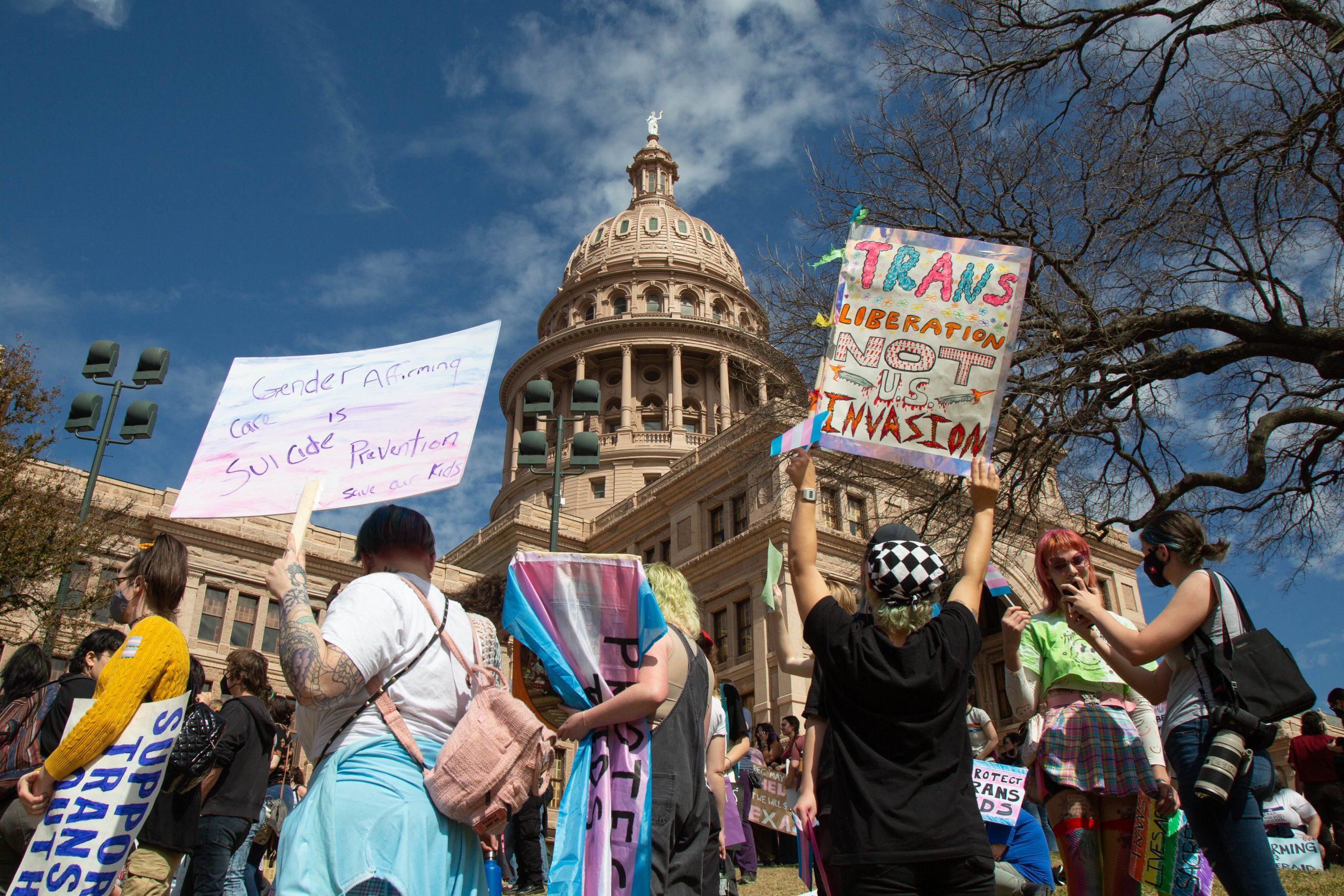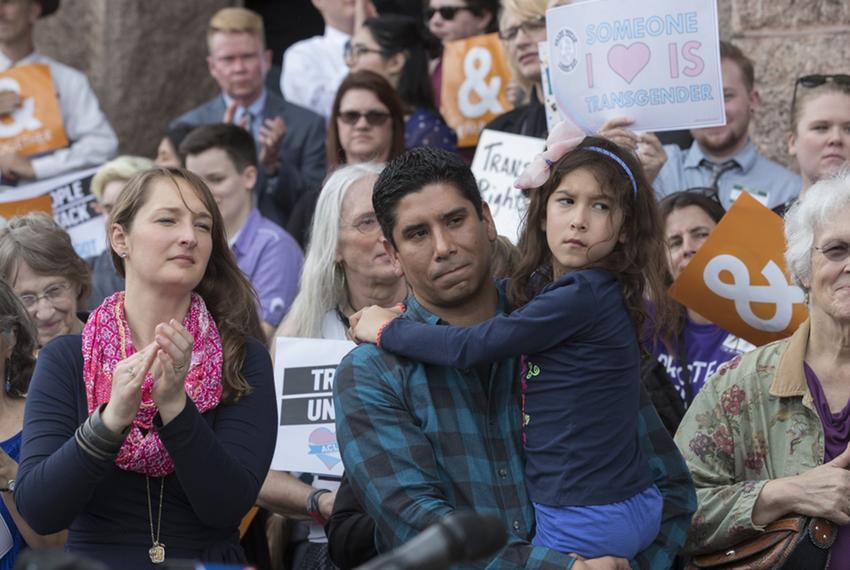
On September 22, Gov. Greg Abbott signed Senate Bill 8 into law, making Texas the latest, and arguably the harshest state to codify discrimination against transgender and gender non-conforming people under the banner of “privacy.”
The new law, set to take effect December 4, forces public schools, universities, government buildings, libraries, and domestic violence shelters to restrict bathroom access based on sex assigned at birth. It levies fines starting at $25,000 and escalating to $125,000 for repeat violations, making it the most financially punitive bathroom bill in the nation.
“This isn’t about bathrooms. This is about control,” said Andrea Segovia, senior field and policy analyst for Transgender Education Network of Texas. “It’s about telling trans people where they can exist. And where they can’t”
For more than a decade, Texas lawmakers have tried and failed to pass bathroom legislation. In 2017, massive public resistance, corporate pressure, and activist organizing blocked the first attempt. But this year, under the cover of a special session called in the wake of historic flooding, SB 8 surged forward with little resistance from business interest that once claimed to be allies.
The Texas House of Representatives approved the bill in August on an 86-45 vote after hours of raucous debate. Protestors were removed from the gallery after shouting down lawmakers backing the bill. A last-minute amendment from Republican Rep. Steve Toth raised penalties to unprecedented levels, while supporters, like Rep. Angelia Orr, R-Itasca, framed the legislation as a protection for women’s “safety and comfort.”
Opponents argued the measure will only incite harassment and violence. “Who do you think is more uncomfortable in the bathroom today? A cis woman, or a trans woman wondering if she’s about to be harassed,” asked Rep. Erin Zwiener, D-Driftwood.
“This bill is cruelty dressed up as protection,” said Rep. Jessica González, D-Dallas, who shared her own experience being harassed for using a women’s restroom at the Capitol. “It is designed to make trans people unsafe, unseen, and unwanted.”
SB 8 doesn’t just police bathrooms; it attempts to shield itself from the law itself.
The legislation grants sovereign immunity to the state, governmental immunity to cities, and qualified immunity to officials who implement it—an unprecedented legal architecture designed to make the law nearly untouchable in court. It also centralizes appeals to the Fifteenth Court of Appeals, whose judges were appointed by Abbott.
“This is the most plainly unlawful, undemocratic legislation I’ve seen in recent history,” said Nicholas Hite, senior attorney at Lambda Legal. “They’re not just targeting trans people, they’re trying to close the courthouse doors on anyone who dares to fight back.”
This legal barricade is a blueprint. It’s the state signaling that it’s not only willing to legislate hate, but to protect that hate from consequence.
SB 8 does not create criminal penalties for individuals. Instead, it punishes institutions—public schools, libraries, shelters that allow trans people to use bathrooms aligning with their gender identity.
Enforcement depends on complaints filed with the Attorney General’s office, enabling anyone to report alleged violations, It’s a system that encourages strangers to surveil bodies, weaponizing suspicion.
“This is a vigilante state,” Segovia said. “They’re turning neighbors into informants. They want trans people to live under constant fear of being reported just for using the restroom.”

Zeph Capo, president of the Texas AFT, warned this will foster hostile environments in schools. “Are complainants going to be chasing people down in bathrooms?” he asked. “That sounds hostile to me and it’s not clear how far this could go.”
The reach of SB 8 extends to domestic violence shelters, barring anyone assigned male at birth from accessing women’t shelters, unless they are minors accompanied by their mothers.
“When you call the hotline, it is often the moment before you believe you will die,” said Molly Voyles, director of public policy at Texas Council on Family Violence. “This law punishes survivors—trans and cis, who are already in crisis.”
The bill’s incarceration provisions also require to house individuals based on sex assigned at birth, a move legal experts say likely violates the Prison Rape Elimination Act.
Ash Hall of ACLU of Texas said, “We cannot ignore the lives of trans people behind bars. This is an open door to violence.”
When Texas tried to pass a bathroom bill in 2017, major corporations spoke out loudly, helping to kill it. This time, the silence is deafening.
With anti-trans policies now openly supported by the federal government under Donald Trump, state leaders face fewer risks. The absence of corporate opposition shows how quickly “inclusion” slogans evaporate when profit isn’t threatened.
“Companies love to wrap themselves in rainbow flags in June, “Segovia said. “But when it matters most, they vanish.”
This wave of anti-trans legislation sweeping the country is not about bathrooms, or locker rooms, or sports teams. It is about creating a climate of state-sanctioned humiliation and strategic erasure. It is about telling trans people they are too visible, too human, too free, and punishing them for daring to live.
These bills are not acts of governance. They are acts of violence in legislative form. They weaponize bureaucracy to make oppression look orderly.
The cruelty is not incidental, it is the point.
SB 8 is not simply policy; it’s a warning flare to trans Texans—we see you, and we intend to make your existence unbearable. But it is also a mirror showing us how fragile and cowardly power becomes when confronted with people who refuse to disappear.
SB 8 joins a growing network of laws in Republican-led states that target trans communities while pushing enforcement onto local institutions. Schools, shelters, and libraries are left holding the bag, forced to choose between compliance and conscience.
“This is about shrinking public space,” said Jacob Reyes of GLAAD. “They want trans people out of schools, out of shelters, out of libraries. But trans Texans are part of our families, our classrooms, our communities. We’ve always been here.”
Legal challenges are inevitable, through the law’s immunity provisions are designed to slow them. In the meantime, trans organizers and allies are preparing, building rapid-response legal networks, expanding mutual aid, and creating safety systems outside the state’s reach.
“Bathroom bills have never been about bathrooms,” Segovia said. “They’re about deciding who gets to exist in public. But we know how to take care of each other. We’ve been doing it long before they write their hate into law.”
History will not look kindly on this. SB 8 is one more scar on the American legal body, proof that hatred can wear a suit and tie, walk into a statehouse, and call itself governance.
But trans Texans, like trans people everywhere are not fragile. They are fire, they are archive, they are proof that survival is an art.
Texas may have chosen cruelty, but the people will choose each other.